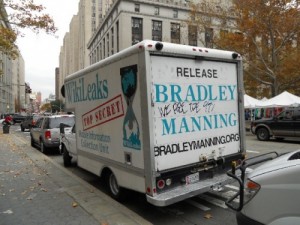Update 5/8/12: WikiLeaks Truck performance tour, media’s silence on whistleblowers, and increased Army security

WikiLeaks Truck
Bradley Manning supporters plan solitary confinement performance tour. Advocates for Manning’s freedom, including ‘WikiLeaks Truck’ artist Clark Stoeckley, plan to tour the northeastern United States, incorporating chatlog quotes to perform a
“site specific, experimental, documentary theater piece examining the conditions of solitary confinement that Bradley Manning was held in without charge in Quantico Marine Corp Brig in 2011.
…
Built into the back of the WikiLeaks cargo truck, the exact dimensions of the solitary confinement cell Manning was held in at Quantico Marine Corp Brig in 2010 will be recreated. A piece of plexi-glass separates the cell from the audience where two guards stand outside at all times. Because it is mobile this allows us to take this piece wherever it is needed.”
The artists are asking for supporters to donate what they can to help finance the project. (Read more…)
Check out the pitch for the performance here:
Edward Wasserman calls on journalists to speak up for persecuted sources and whistleblowers. Summarizing the various whistle-blowers persecuted under the Obama administration, culminating with the “biggest case,” that of PFC Bradley Manning, Wasserman calls the government’s reasoning into question:
“The administration seems undeterred by the scanty evidence that any of these defendants was out to hurt the country, a mainstay ingredient of espionage, and the Manning judge has even warned prosecutors they must show he believed he was “aiding the enemy” or she would toss the most serious charge against him.”
Wasserman continues, calling on reporters to publicly denounce this wave of aggressive prosecutions:
“[Journalists’] silence constitutes an abdication of the media’s role as a voice in shaping public policy. After all, the ultimate purpose of reporter shield laws and the defiant tradition of protecting confidential sources isn’t to make writing stories easier for reporters, it’s to ensure that publicly significant information comes to light.
If the news media publish sensitive information, fully believing it ought to be made public, how can they stand by without protest when the government punishes the people who furnished it?
They can’t. The government may have found a way to suppress the flow of news without ruffling the feathers of reporters, but that doesn’t absolve the media of their duty to speak out for that flow.
The challenge now is for the media to rediscover their voice.”
Reporters, of course, rely on whistle-blowers, sensitive information, and protected sources to deliver news every day. It’s high time they spoke up. (Read more…)
Army plans to increase surveillance of soldiers. Instead of addressing massive overclassification, punishing newly exposed war criminals, or thanking the whistle-blower who exposed them, the Army learned a different lesson from WikiLeaks’ releases: it believes soldiers should be under more surveillance:
In the wake of the biggest dump of classified information in the history of the Army, the brass is searching for ways to watch what every soldier is doing on his or her Army computer.
The Army wants to look at keystrokes, downloads and Web searches on computers that soldiers use.
Rather than looking inward and examining why so many documents are kept secret from the public that funds the military with its taxes, the Army chooses to crack down harder on intelligence analysts lest they become inspired by the WikiLeaks whistle-blower. (Read more…)

"My name is Kim Lundström, I live in a town called Umeå in Sweden. Im an unemployed geek and I am Bradley Manning because the truth is always the answer."









